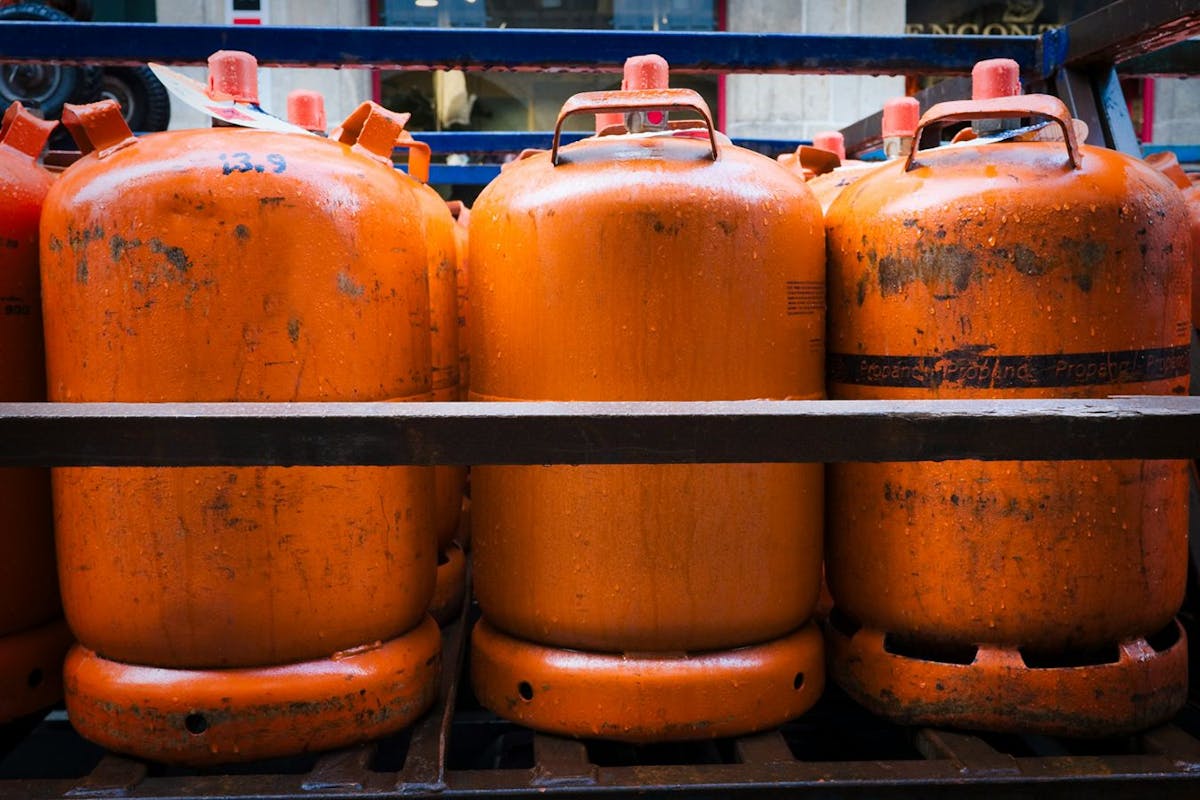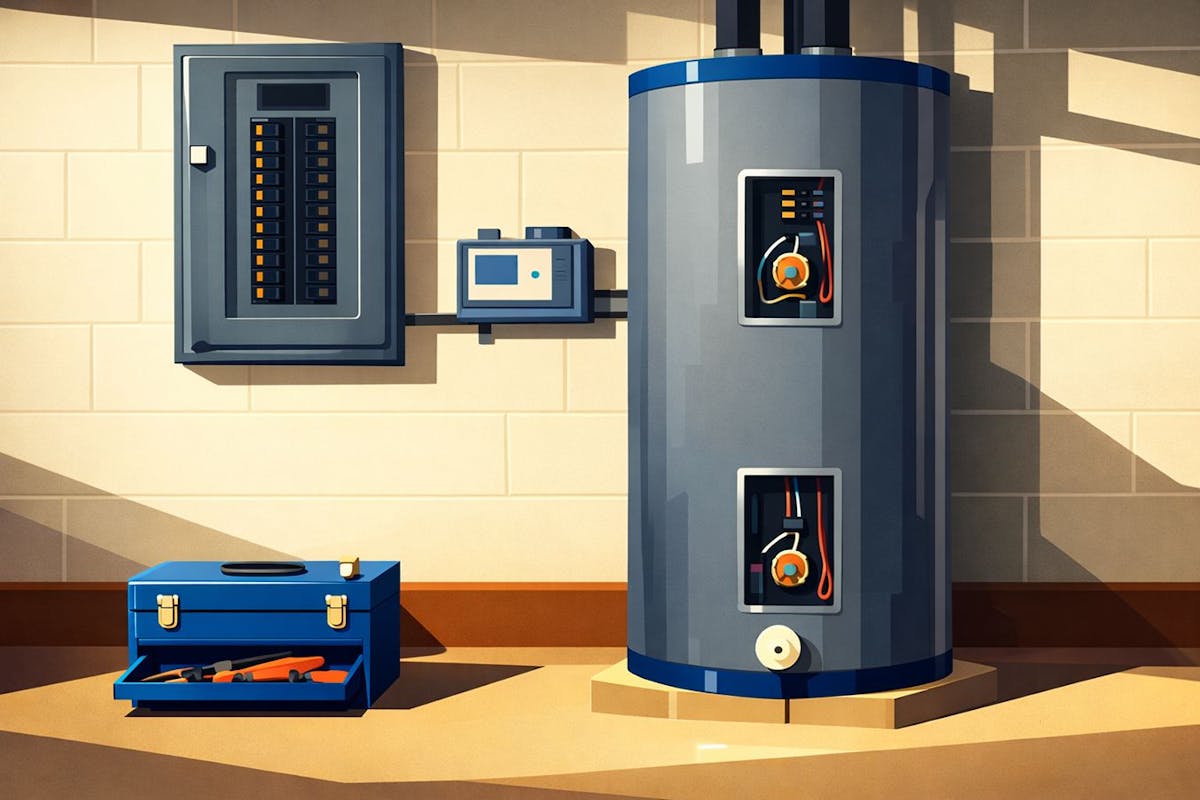Heat Pump vs. Propane Heating for Your Home
Last edited
Author
Andrew Giermak
Solar and Electrification Writer and Editor
Editor
Andrew Blok
Electrification and Solar Writer and Editor

Many areas of the US, especially those with long, cold winters, have used propane for home heating and other energy needs for years. Modern high-efficiency heat pumps are now an option for more people and regions than ever before. A new heat pump will give most users higher energy efficiency, lower energy bills, reliable comfort, and heating and cooling in one system. A heat pump, especially with home solar panels, is a much cleaner heating system, as well.
If you heat your home with propane, a heat pump heating could be a smart upgrade.
See how much you can save with a new HVAC system from Palmetto
What is a heat pump?
Heat pumps use electricity to move — instead of generate — heat into or out of a home or building. A main benefit with a heat pump is it provides heating and cooling in one system.
Heat pumps are very energy efficient, which can save you money. They can also reduce the cost of home maintenance, since you only need to care for one machine instead of two. A heat pump is the most energy-efficient HVAC option for a large majority of US homes and in nearly all climate areas of the country.
Air source heat pumps run at about 300-400% efficiency, transferring three or four times the thermal energy as the energy (electricity) used. Geothermal heat pumps can reach over 500% efficiency.
How propane heating works
Propane heating for a home works similar to heating with natural gas and a furnace, but is often used on properties without access to natural gas. A propane user must store propane in a tank on their property. The gas runs into a burner or furnace and hot air is sent into the home. Propane heating systems have an efficiency rate up to about 98.5%.

A propane storage tank in need of a wash. Photo by Randall Mann via Unsplash
The price of propane depends on supply and demand, geographic region, and by the company providing it. The average price of residential propane gas in the US in summer 2025 is $2.52 per gallon according to the US Energy Information Administration. Demand and prices generally rise in the winter.
Rural areas with longer, colder winters use propane heating most. The upper midwest and plains states, Wisconsin, Minnesota, Iowa, and the Dakotas, along with some usage in New England, make up most propane heating use in the US. According to the Energy Information Administration, 9% of US homes use propane for heating or at least one appliance. North Dakota and Vermont use propane the most.
With propane gas heating, users have fuel stored on their property, which is a positive and a potential negative. You can use propane to power water heaters, ovens/stoves, dryers, and fireplaces.
Disadvantages with propane heating include it emits greenhouse gases and pollutants. It must be safely stored, as it’s flammable, and the venting must work safely and properly. It is less efficient than using a heat pump for heating. It is generally more expensive compared to heat pump heating.
See how much you can save with a new HVAC system from Palmetto
Propane furnace vs. heat pump
Modern heat pumps are an energy-efficient and cost-effective heating, and cooling, option for more homes in more regions and climates than ever before, including in the cold-weather areas where propane is a common heating choice. Cold climate heat pumps are built, tested, and certified to work and maintain a high level of efficiency down to very cold temperatures. Heat pumps are also safer and run on much cleaner energy — including home solar power.
Comparing the utility cost between a heat pump and propane heating, the US Department of Energy found an annual savings range of $889-$2,811 with a heat pump. In Michigan, the DOE found homes switching from propane or older electric heating to a cold climate heat pump save an average of $1,500 a year.
How could a heat pump be a better year-round heating and cooling system for your home?
| Heat pump | Propane | |
|---|---|---|
| Efficiency | Often 300-400%, can be over 500% especially with geothermal heat pumps | Up to 98.5% |
| Functionality | Heating and cooling | Heating |
| Fuel source | Electricity | Fossil fuel |
| Fuel tank | No | Yes |
| Emissions | Lower (with grid electricity) or lowest (with home solar panels) | Higher |
Will a heat pump work for you?
Going to a heat pump as the year-round answer for your home heating and cooling could lead to even more utility bill and energy savings, especially if you combine it with home solar panels. It pays to consider your usual heating and cooling use, your local utility rates, and incentives you may qualify for by going to an energy-efficient heat pump. If a heat pump seems like a good idea, but a large upfront expense doesn’t, a heat pump lease could be the best option.
A lease, such as with the Palmetto Comfort Plan, lets you have a modern, efficient heat pump with no cost upfront and all service and maintenance included for the life of the lease.
You can learn more and see estimates customized to your home address with our HVAC advisor tool, Savings Maximizer, or solar savings tool. You can also download and start your free account on the new Palmetto app to see your energy usage, energy expenses, discounts on energy-saving devices, and potential savings.
See how much you can save with a new HVAC system from Palmetto
Frequently asked questions
If my home uses propane, will switching to a heat pump save me money?
It’s important to look at the cost of a new system, plus installation, energy rates in your area, and differences in efficiency, but for many homes, going to a heat pump can give you savings. A heat pump is likely to give you long-term savings in fuel cost, efficiency, the two-in-one functionality of a heat pump, and maintenance. Department of Energy data shows estimated annual savings of about $900 and higher.
What’s the most efficient way to heat a home?
Heat pump heating and cooling is the most efficient HVAC system for most homes in most areas and climates. It’s important to take certain factors, such as home size, your area energy rates, and your heating and cooling usage, into account when replacing your heating with propane, heat pump, or another system.
Can heat pumps replace propane in cold climates?
Heat pumps, specifically certified cold climate heat pumps, are tested to work and maintain high efficiency in temperatures at or below zero. Heat pumps work in a wider range of climates than ever before.
Lead photo by Eric Prouzet on Unsplash.


